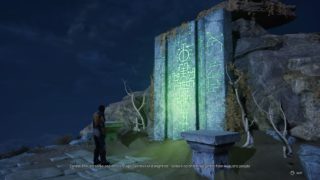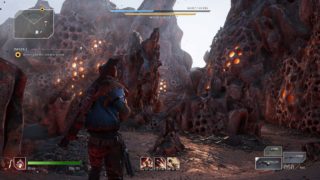Outriders review: A slick but unnecessary looting sim
People Can Fly’s always-online shooter can be fun in short bursts, but it’s simply not worth the journey
- Game director
- Bartosz Kmita
- Key Credits
- Joshua Rubin (Lead writer), Inon Zur (Composer)

What does wasted time look like? If you could petrify it into an object, what object would it be? In Outriders, the answer is a pile of under-levelled equipment. Each chunk of gear represents, oh, about five or ten minutes of playtime – the length of the average firefight, which almost always ends with the semi-random dispensing of a new armour piece or gun.
If the inventory weren’t finite, you could open it at the conclusion and calculate the hours you’ve spent by totting up all these finds – from generic “rusty” firearms all the way up to gold-badged legendary oddities that drip with molded fittings, decals and trashy SFX. But your inventory is finite, so at intervals, you group-select a bunch of obsolete hats or pistols and hold a button to scrap them. It feels like literally burning time. 24 guns dismantled? That’s three or four hours down the drain.
Or at least, sent to recycling. The trick to Outriders, as with most “looter-shooters” that mix Gears or Halo with Diablo, is that dismantling equipment earns resources and mods you can use to build and level up other equipment. The opening 15 hours of this dreary offworld endeavour are really just a source of ingredients for the later stretches, when you start to craft your own toys.
During this grand compost heap of a prelude, it’s generally safe to ignore all the stats and coloured bars on the inventory screen. All you need to look out for is the green arrow that indicates that an item’s offensive or defensive capability is higher than the one you have equipped, which you promptly melt down for parts.
You could call this a kind of alchemy: the slow distillation of the One True Loadout from dozens of hours and thousands of weapon permutations; the gradual assembling of a one-size-gibs-all combat package that allows for optimal destruction and the greatest resilience. You could say that all the gathering and scrapping is necessary preparation for this regrettably always-online game’s co-op missions: at higher difficulty thresholds, the party may live or die based on how well each player’s loadout complements the others.
Or you could say that it’s like chewing down an entire buffet’s worth of food so that you can puke up exactly the dish you want on command, whereupon you realise that every dish tastes broadly the same.
As a shooter, Outriders is clever but unsurprising and done little justice by its bloat: it’s maybe five hours of engrossing ideas stretched out into a 30-hour-plus exercise in kicking a vending machine. This is both a waste of potential and entirely the point. The ostensible hooks for a game like this aren’t the tools in themselves, but the endless, roulette-wheel process of acquiring them.
Appropriately for a looting game, Outriders is also a story of space colonialism. Your character is one of many migrants fleeing a cindered Earth to an unspoilt planet, Enoch. On arrival, you are granted a brief glimpse of the sunny uplands before an encounter with a violent spacetime Anomaly sees you being placed in cryosleep.
“As a shooter, Outriders is clever but unsurprising and done little justice by its bloat: it’s maybe five hours of engrossing ideas stretched out into a 30-hour-plus exercise in kicking a vending machine.”
Awakening decades later, you discover that Enoch has become a billowing brown warzone and that you have quasi-magical powers – the basis for the game’s four character classes. Reuniting with a few of your old shipmates, now coarse and grizzled veterans, you set out on a trek across Enoch towards a mysterious signal, hoping to discover paradise once again.
This journey’s most important function is to disguise the fact that you are going nowhere, that all the gorgeous landscapes you traverse and creatures you meet/kill are just repeated pulls on the one-arm-bandit handle that is the game’s looting system.
You could say much the same of many RPG-inflected shooters, of course, but Outriders stands out for the unabashed way it borrows from similar games, mixing Gears of War‘s ravaged aesthetic and cover combat with The Division‘s class system, crafting mechanics and item rarities. It is both a game about plundering and an unusually obvious plundering of elements from other games about plundering.

Still, it has a certain swaggering complexity that’s all its own. The basis of Outriders combat is hiding behind things and shooting over them, then working your way down the flank once opponents are dug in. As in The Division, special abilities allow you to upset these rhythms a little, freezing foes solid or yanking them toward you with a telekinetic flick of the wrist. The game’s dozens of equipment mods bend the rules still further, with bullets that induce anti-gravity and boots that double the width of your AOE blasts and stir in flaming debris for good measure.

The classes are familiar but elegantly thought-out, with eight active abilities to unlock plus an initially impenetrable web of passive boosts, which gradually skew your approach towards certain weapons or tactics. The Devastator is the tank, striding down the centre with its rocky armour. The Trickster is a brittle assassin, no sooner seen than gone, while the Pyromancer is a mid-range battlemage. The Technomancer is the support, chucking down turrets and heals from afar.
It’s a sturdy mesh of styles that leads to a familiar division of labour during co-op missions (you can matchmake from the lobby screen or at base camps), some players rushing in while others keep their distance.
Also quietly accomplished is Outriders’ approach to difficulty. Enemy level together with the probability of discovering rarer equipment is determined by your world tier. Killing things not only earns you XP but fills your world tier bar, eventually unlocking a higher tier. You can revert to a lower tier at any point, however, reducing the pressure together with the odds of a juicy find.
Some of the class abilities are designed to interrupt enemy spell-casts, which have a visible charging period. This introduces an element of counterpunching to boss battles, but bosses slowly develop a resistance to interruption, so you can’t just trip them up indefinitely. The combat is lent pace by the vampiric health system, which is designed to reward aggression and brinkmanship.
There are few straightforward self-healing abilities, most confined to the Technomancer – instead, you’ll patch yourself up by dealing damage, as determined by your class and gear. This keeps you moving through the battlefield and taking risks, grazing on the small fry as you slowly wear down the bigger fish.
It all represents a level of intrigue you won’t find in the story, which recalls People Can Fly‘s celebrated Bulletstorm in its brutality but has precious little of that game’s sense of humour. Rather, the writers try for a “mature” tone that simply isn’t a good fit for the chunky idiocy of the blood-letting or the jingling casino operation that is the shoot-loot treadmill.
It’s a tale bogged down by awareness of its own superfluity. For all the carnage, with named characters often murdered the moment they’re introduced, the overriding tone isn’t anger or fear but boredom. Everybody is sick of being here, and not just because their promised new Eden has proven to be a toxic dump. Most people are glorified shopkeepers – major plot characters, if you can call them that, are found slumped near piles of crates at your base camp in each region, there to dispense upgrades, cosmetics and the occasional sidequest.
The player-customised lead character appears to understand that her dramatic arc is of secondary importance to the enhancing of her gear. She reacts to most quest offers with a sneer, a shrug and an eye-roll – “here we go again”.

The cast is a mixture of tedious fascists, nervy scientists, “hilarious” oddballs and an insulting parody of pre-technological indigenous tribes – that you are encouraged to sympathise with the latter, Avatar-esque group doesn’t make the game’s fondness for Magic Native stereotypes any more bearable.
To its credit, Outriders never suggests that your presence on this world is benign, like Mass Effect: Andromeda. It more or less starts from the perspective that colonial frontiers are sites of slaughter, but it doesn’t do anything useful with this knowledge. It just punches the bruise.
The endgame harbours one of those “we were the real villains all along” revelations, in case you missed the memo after hours of summary executions and turning native species into giblets for the sake of gloves and hats. When the script tries for pathos it just comes off as twee: in particular, the slow-mo resolution of one particular estranged-dad-and-daughter plotline made us want to switch off the console.
The landscapes, at least, slice away some of the banality. While apparently cribbed from a Sonic the Hedgehog zone list, they are often breathtaking. Deep in the desert, there are dusty, pearlescent canyons where you can all but feel the heat lifting off the ground. There’s a road of bombed-out tanks that eerily recalls the Highway of Death between Iraq and Kuwait, a blue-lit jungle that teems with floating obelisks, and a fallen city gleaming against the bulk of an wrecked starship engine.
“It’s a tale bogged down by awareness of its own superfluity. For all the carnage, with named characters often murdered the moment they’re introduced, the overriding tone isn’t anger or fear but boredom.”
But the game doesn’t really want you to care about these places, or even really look at them: it just wants you to shoot rewards out of them. If the backdrops vary, the geometry repeats: think roomy corridors and basins with chest-high walls strewn all over like sacred cows, high-up spots for snipers and partly-screened flanking routes for skirmishers.
The optional fetchquests and bounty hunting missions that flower in areas you’ve explored all follow the same format: a conversation, one or two fights, a boss. There are, of course, lore documents to pour over but they’re flatly written and so dutifully dropped into the landscape that you never feel like searching for them. You’ll force them down like giant spoonfuls of Victorian medicine, striving to persuade yourself that this is a planet’s worth of stories rather than a mincing machine.
Outriders is its own greatest victim. There are some decent ideas in here – an absorbing cauldron of combat variables, some majestic geography, even a few guns worth holding onto – but they’re dragged down and suffocated by a game that doesn’t want to entertain you but hypnotise you with the prospect of another trinket.
By the time you’ve slogged through the opening third and amassed the resources and insight to manufacture trinkets of your own, the combat has lost its thrill. There is nothing of great interest over Enoch’s horizon. Do yourself a favour and spend those 30-plus hours elsewhere.
Outriders is its own greatest victim. There are some decent ideas in here – an absorbing cauldron of combat variables, some majestic geography, even a few guns worth holding onto – but they're dragged down and suffocated by a game that doesn't want to entertain you but hypnotise you with the prospect of another trinket.
- Some beautiful environments
- Slick and elaborate, if familiar third-person shooting
- Loot grind bleaches away the combat's thrill
- Dull, lifeless story and writing
























